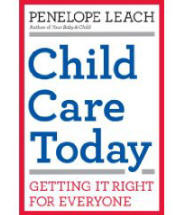There could not be a more important time for a national spotlight to turn to Child Care (and let us hope with a new Presidential Administration it might). Filtered through the lens of the unique challenges we all face in 2009, it is one of the key issues to which we are returning Executive Moms’ attention. Thus the publication of famed British parenting expert Penelope Leach’s brand new tome on the state of Child Care could not offer greater confluence. It’s apt title:
Child Care Today: Getting It Right for Everyone…
If you (or maybe even your parents) still have a copy of the classic ’70s parenting bible, “Your Baby and Child: From Birth to Age Five,” Leach should be a familiar name. With her latest work, she has turned her attention to the world of child care versus child rearing. This is not a “how-to-pick-your-child-care” book; rather, through extensive research globally Leach explores and draws implications from how various nations approach it today.
 Leach has been controversial in the past for her views on child care, but we have to appreciate her new, practical and working mom-friendly foundation perspective for her book: “Since nonparental child care is an integral part of modern life, discussing whether it is bad for children is no more useful than discussing whether we would all be better off without television or the internet. It’s the wrong question.” Another key foundation point is the recognition of the changing nature of families today. If you go back far into the “Executive Momorandum” annals, you will see that one of our earliest missives revolved around the concept that it really does “take a village” when it comes to child care, and in actuality the notion that child care should fall solely and exclusively on the mother is not the norm across history or cultures. However, as every (American) working mother knows today, few of us have a village. We do not live in extended family households– and yet child care costs are extraordinary. Leach drives to a simple yet critical finding that it is the quality of the care that matters most. The right question? How to improve it, for everyone.
Leach has been controversial in the past for her views on child care, but we have to appreciate her new, practical and working mom-friendly foundation perspective for her book: “Since nonparental child care is an integral part of modern life, discussing whether it is bad for children is no more useful than discussing whether we would all be better off without television or the internet. It’s the wrong question.” Another key foundation point is the recognition of the changing nature of families today. If you go back far into the “Executive Momorandum” annals, you will see that one of our earliest missives revolved around the concept that it really does “take a village” when it comes to child care, and in actuality the notion that child care should fall solely and exclusively on the mother is not the norm across history or cultures. However, as every (American) working mother knows today, few of us have a village. We do not live in extended family households– and yet child care costs are extraordinary. Leach drives to a simple yet critical finding that it is the quality of the care that matters most. The right question? How to improve it, for everyone.
The frustrating reality: if we want really great child care, we all have to move to Sweden.
The global comparisons made here provide another dramatic reiteration of what many of us already know: no country does a worse job with publicly-funded child care opportunities and parental-leave policies than the U.S. (Sweden, on the other hand, gives mothers 480 days (!) of maternity leave at 80% of their wage).
On a positive note, those conclusions needs to add fuel to the conversation that, to engender healthy and happy children who grow up into healthy, happy and productive adults, our nation has to see child care as an investment, not a cost, and thereby ensure that we stop making commitment to career and commitment to family the paradox it can be for too many.











Add Your Comment